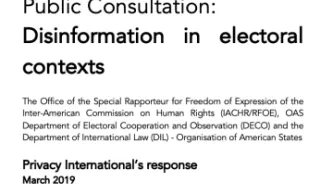Search
Content type: Examples
Bethany Christian Services, an international pregnancy support and adoption agency, is launching a programme with Copley Advertising to send targeted ads to individuals visiting Planned Parenthood clinics, abortion clinics, methadone clinics and high-risk areas (AHPA). The targeting will be done through the use of geo fencing based on smartphones located within the selected locations.
Source: https://www.liveaction.org/news//adoption-agency-send-pro-life-ads-smartphones-inside-abortion-…
Content type: Examples
In 2018, Brian Hofer, the chair of Oakland's Privacy Advisory Commission, filed suit after police wrongfully stopped him at gunpoint because their automated license plate recognition system, supplied by Vigilant Solutions, indicated that the rental car he was driving had been stolen. The car had in fact been stolen some months earlier, but been recovered. Despite such errors, police claim that the technology has helped reduce crime, identify stolen vehicles, and identify and arrest suspects.…
Content type: Examples
New workplace technologies are generating mountains of data on workers despite a lack of clarity over how the data is used and who owns it. In offices, smart badges track interactions and sensors track fitness and health; in trucks sensors monitor drivers' performance in the name of safety. In the US state of Illinois, between July and October 2017 26 lawsuits were filed by employees alleging that their employers had violated the state's Biometric Information Privacy Act, which requires a…
Content type: Examples
After four years of negotiation, in 2017 Google began paying Mastercard millions of dollars for access to the latter's piles of transaction data as part of its "Stores Sales Measurement" service. Google, which claimed to have access to 70% of US credit and debit cards through partners, said that double-blind encryption prevents both partners from seeing the other's users' personally identifiable information. Mastercard said the company shares transaction trends with merchants and their service…
Content type: Examples
In November 2018, 112 civil liberties, immigrant rights groups, child welfare advocates, and privacy activists wrote a letter to the heads of the US Department of Health and Human Services and the Department of Homeland Security demanding an immediate halt to the HHS Office for Refugee Resettlement's practice of using information given them by detained migrant children to arrest and deport their US-based relatives and other sponsors. The policy began in April 2018, and the result has been that…
Content type: News & Analysis
Picture Credit: US AID
US President Trump has been cutting aid to Central America, including a surprise cut of approximately $500m in aid to the “Northern Triangle” countries of El Salvador, Guatemala, and Honduras, apparently as punishment for “doing absolutely nothing” to prevent emigration to the US.
What remains of the funds is largely and deliberately being repurposed for spending on the US’s own security interests: indeed, one area which his…
Content type: News & Analysis
Foto: US AID
El presidente estadounidense Trump ha estado recortando la ayuda a Centroamérica, incluyendo un recorte sorpresivo de aproximadamente 500 millones de dólares a los países del “Triángulo del Norte” (El Salvador, Guatemala y Honduras), al parecer como castigo por “no haber hecho absolutamente nada” para impedir la emigración hacia los Estados Unidos.
Los fondos restantes están siendo reorientados,en su gran mayoría y deliberadamente, al gasto para…
Content type: Long Read
Image courtesy of Michael Coghlan
The long-speculated Facebook cryptocurrency is finally here! Libra!
Libra Association, an entity co-founded by Facebook, has announced the creation of a new cryptocurrency, Libra, "a simple global currency and financial infrastructure that empowers billions of people".
The white paper that outlines the rationale for the new currency makes a number of heady statements, some which anyone who cares about rights should commend -- and some which should…
Content type: Advocacy
Privacy International has today sent letters to leading social media platforms to ask what they're doing to protect their users' from dangerous surveillance by government immigration authorities.
The letter comes following the implementation of plans by US authorities to require nearly all visa applicants to hand over identifiers of all social media accounts they have used in the previous five years, or face “serious immigration consequences”.
The move not only represents…
Content type: News & Analysis
US Immigration and Customs Enforcement (ICE), the agency at the centre of carrying out President Trump’s “zero tolerance” approach to immigration enforcement and family separation, has for years been contracting a US surveillance company to intercept peoples’ communications across the United States. The wide potential scope for the use of the powers raises concerns about their use for the real-time surveillance of people, families, and communities caught up in Trump’s immigration crackdown…
Content type: Examples
Virginia Eubanks explains what we can draw from understanding the experience of surveillance of marginalised groups: it is a civil rights issue, technologies carry the bias of those who design them, people are resisting and why we need to move away from the privacy rights discourse.
https://prospect.org/article/want-predict-future-surveillance-ask-poor-communities
Author: Virginia Eubanks
Publication: The American Prospect
Content type: News & Analysis
The first half of 2018 saw two major privacy moments: in March, the Facebook/ Cambridge Analytica scandal broke, followed in May by the EU General Data Protection Regulation ("GDPR") taking effect. The Cambridge Analytica scandal, as it has become known, grabbed the attention and outrage of the media, the public, parliamentarians and regulators around the world - demonstrating that yes, people do care about violations of their privacy and abuse of power. This scandal has been one of…
Content type: Advocacy
Consultation Submission
In March 2019, Privacy International submitted a response to a consultation on Disinformation in Electoral Contexts, led by the Office of the Special Rapporteur for Freedom of Expression of the Inter-American Commission on Human Rights together with the Department of Electoral Cooperation and Observation (DECO) and the Department of International Law (DIL) of the Organisation of American States (OAS).
In our submission we highlighted the importance of minmising data…
Content type: Examples
Facebook's latest tool for inspecting political ads showed that in the run-up to the US mid-term elections in November 2018, many of the same politicians who had been questioning Facebook about privacy and leaked user data were spending campaign funds on advertisements on the service. Between 2014 and 2018, the digital percentage of political spending rose from 1% to 22% (or about $1.9 billion); between May and November 2018 political spending on Facebook and its subsidiaries came to nearly $…
Content type: Long Read
During the last World Economic Forum in Davos, the CEO of Microsoft joined the chorus of voices calling for new global privacy rules, saying the following in regard to the new European General Data Protection Regulation (GDPR):
“My own point of view is that it's a fantastic start in treating privacy as a human right. I hope that in the United States we do something similar, and that the world converges on a common standard."
We have come a long way. From tech companies fighting and…
Content type: News & Analysis
Federal law enforcement is deploying powerful computer hacking tools to conduct domestic criminal and immigration investigations.
By Alex Betschen, Student Attorney, Civil Liberties & Transparency Clinic, University at Buffalo School of Law
Hacking by the government raises grave privacy concerns, creating surveillance possibilities that were previously the stuff of science fiction. It also poses a security risk, because hacking takes advantage of unpatched vulnerabilities in our…
Content type: Press release
FOR IMMEDIATE RELEASE
December 21, 2018
CONTACTS:
Alex Betschen, Civil Liberties & Transparency Clinic, [email protected], 716–531–6649
Colton Kells, Civil Liberties & Transparency Clinic, [email protected], 585–766–5119
Abdullah Hasan, ACLU, [email protected], 646–905–8879
NEW YORK — Privacy International, the American Civil Liberties Union, and the Civil Liberties & Transparency Clinic of the University at Buffalo School of Law filed a lawsuit today…
Content type: News & Analysis
Photo credit: US Immigration and Customs Enforcement
The trial of Mexican drug lord Joaquin “El Chapo” Guzman started in New York back in November 2018. But last week, the jurors were presented with a trove of new key evidence: dozens of text messages exchanged between Guzman, his wife, and his mistresses.
The reason behind this set of revelations? Guzman had been spying on his wife and mistresses, using publicly-available surveillance software called FlexiSpy. Once installed on his targets…










